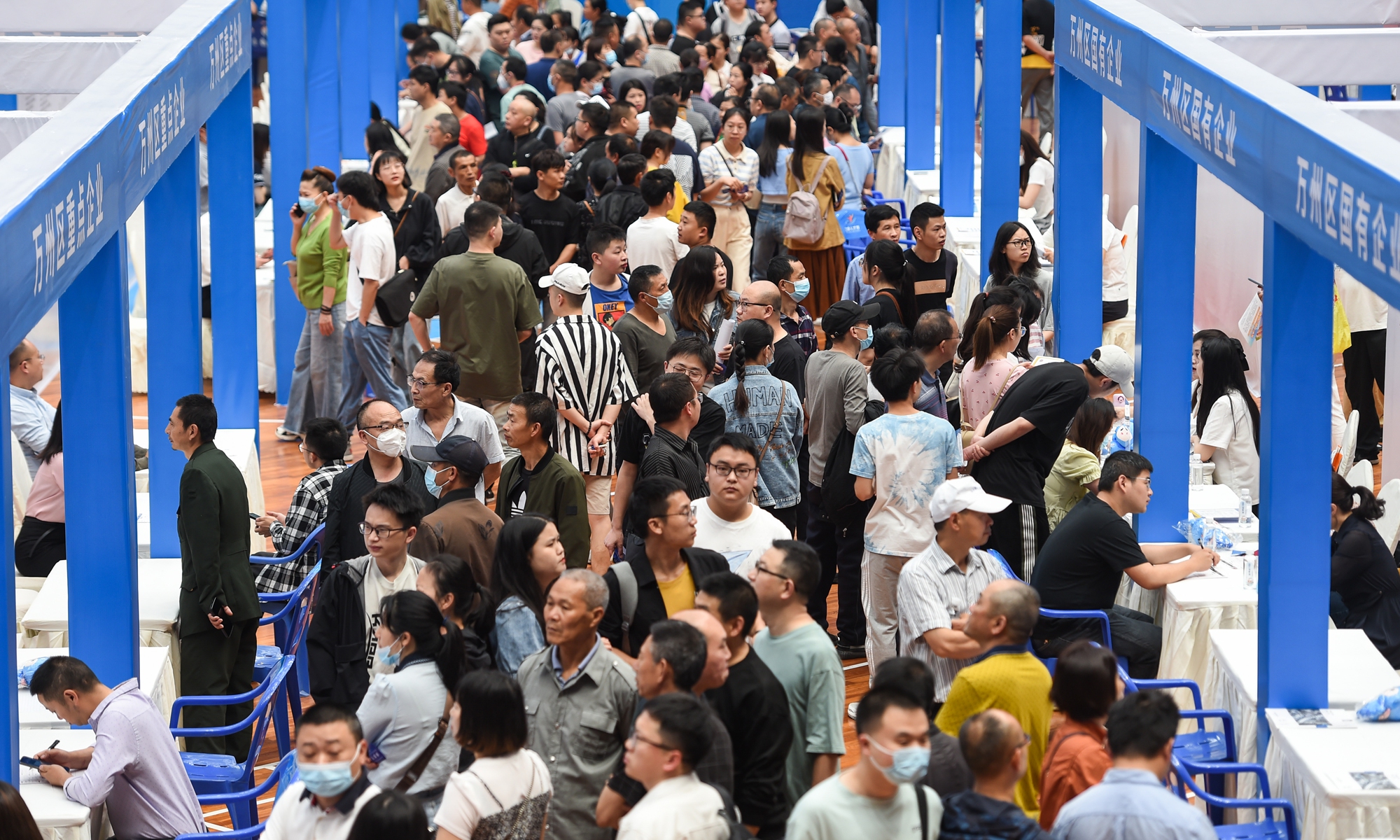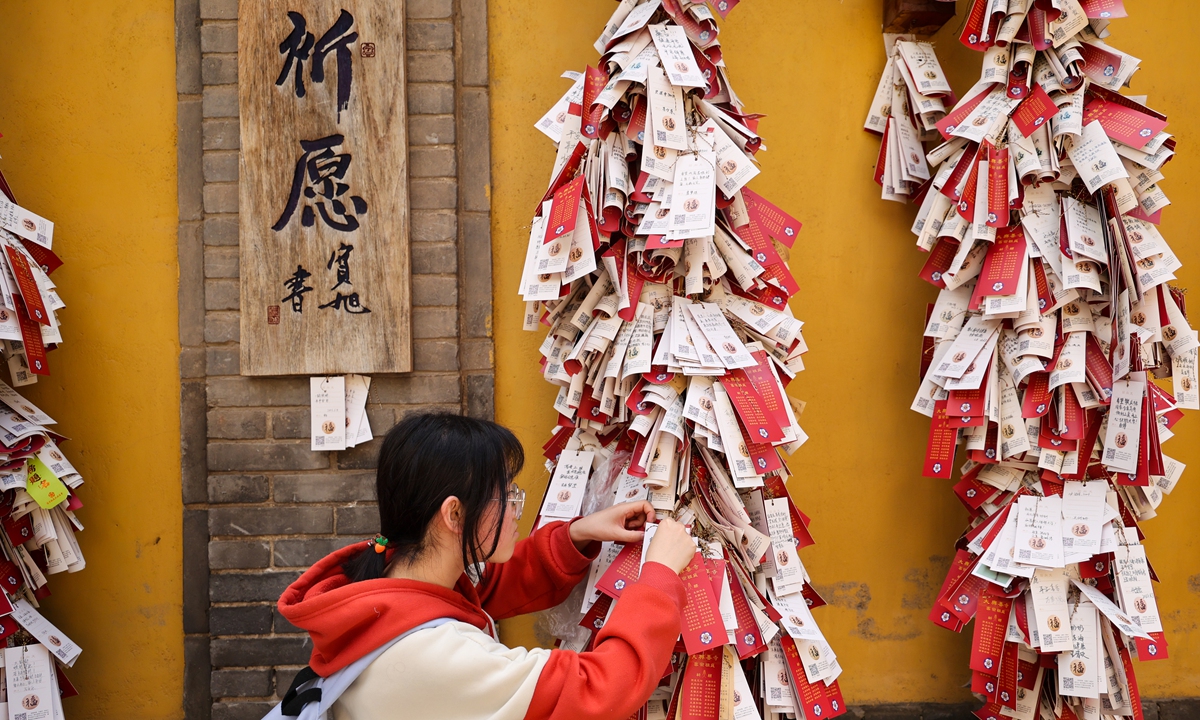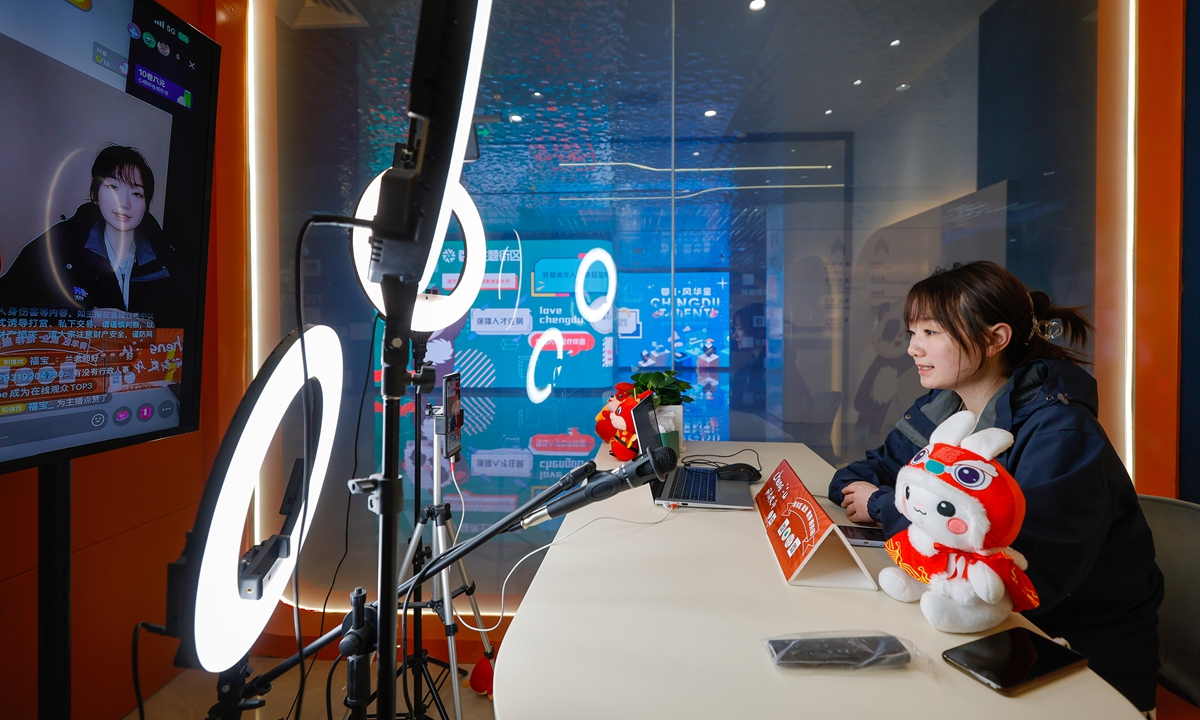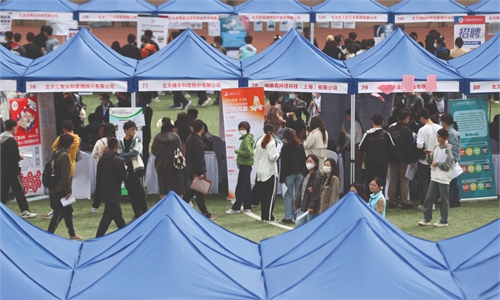IN-DEPTH / IN-DEPTH
Young Chinese tackle stress, navigate to hope during toughest job season
Hunt for diversity

A large-scale job fair at the first Three Gorges Talent Festival in Southwest China's Chongqing Municipality attracts many job seekers, on May 14, 2023. Photo: VCG
As graduation season approaches, Zhang Mingqian's unusual career path becomes even more evident to her. As a 37-year-old housewife, Zhang never imagined that one day she would become a professional shopper at the Yonghe Lama Temple in Beijing, purchasing protective amulets or bracelets made of incense ash, mainly for young people who are a decade younger than her.She also never expected that so many graduates would visit temples to worship Buddha as a popular "remedy" to cope with their pressure during the toughest job season.
Unlike the specter of bleakness in employment prospects in China as portrayed by the Western media - young Chinese have willingly fallen into a state of self-anesthetization, Zhang feels that during her interactions with the group, they showed desires, ideas, and clear plans for the future.
Experts pointed out that the popularity of Buddha worship among Chinese graduates should not be simply equated with a "serious decline of the Chinese economy" or a "lack of ambition among the young generation" as some Western media outlets have hyped, but should be seen as a consolation for their perplexed souls, a way to deal with their anxieties and a yearning for a meaningful career.
The COVID-19 pandemic, the record high in the number of graduates and the rapid pace of social change brought about by the internet era have created certain problems and challenges for young people entering society today more than ever before. However, Chinese youth are determined to purse a life with the meaning of success being defined by their values, not traditional social norms. As they navigate the winding road of life, they are full of hope.
New way of releasing pressure

A female student prays for blessings at a temple in Xi 'an, Northwest China's Shaanxi Province, on June 5, 2023. Photo: IC
Being a shopper at the temple is undoubtedly hard work. Zhang needs to wake up at 7 o'clock every day and stand in line at the sales stand, braving the current heat, earning a purchasing fee of 50 yuan ($7) for each order. However, Zhang also finds this business to be very interesting as it provides her access into the innermost thoughts of young people."They often talk about the current severe employment situation on their WeChat moments, claiming that they want to escape 'shiny jobs in skyscrapers,' while also devoutly making wishes in front of Buddha, hoping to find a good job," Zhang told the Global Times.
Data from online ticketing platforms shows that since the beginning of this year, the number of temple-related scenic spot ticket orders increased by 310 percent year-on-year. Among the people who have booked tickets since February, the post-1990s and post-2000s generation account for nearly 50 percent.
Offering incense and wearing Buddhist prayer beads have become a necessary ritual for many young people when looking for a job. Zhang believed that this ritual is a means for young people to alleviate the pressure and anxiety of job hunting.
"Whether it be with me, with Buddha, or with others, this generation of young people yearns to be 'rescued' through various forms of communication," Zhang said.
In addition to going to the temple, 28-year-old Mo Lei spent a lot of money trying to find another antidote for himself. Mo, who graduated with a dual degree from one of China's top five universities, is still struggling to find the right path for himself three years after graduation.
This spring, he spent 3,000 yuan on a long-term life-coach program, deciding to seek professional career guidance to discover his strengths and weaknesses, and find the direction that truly suits him.
The concept of life-coaching, which originated abroad, has quietly gained popularity among young job seekers and entrepreneurs in China over the recent years.
"The coach assigned me some homework, such as requiring me to interview two industry veterans every month, or asking me to record my specific work performance and feeling every week, and he trained me on how to succeed at job interviews. Through specific measures, it resolves my confusion, and makes me solve problems step by step instead of getting trapped in illusion. The coach takes me where I've never been before," Mo told the Global Times.
Multiple sources of stress
Senior career consultant, Xue Yiran, who has over 20 years' experience in human resources, has provided one-on-one consultations for more than 2,000 candidates. She has witnessed an increase of candidates seeking her professional advice in recent years, the largest demographic being fresh graduates and her clients are getting increasingly younger.
In 2023, 11.58 million students graduated from university, and this marks the first year that doctorate and postgraduate students have surpassed the number of undergraduate students. Unemployment rose to 20.8 percent among 16- to 24-year-olds, according to figures released by the National Bureau of Statistics on June 15.
"Current instability in the employment market has created great uncertainty and an increased sense of anxiety for many young people. Their confusion has become more apparent since the outbreak of the pandemic, which adds their sense of uncertainty," Xue told the Global Times.
But this situation is not unique to China. On May 27th, the International Labour Organization released the 4th edition monitor of the "COVID-19 and the world of work." The report shows that since the outbreak of COVID-19, one-sixth of young people worldwide out of work due to coronavirus crisis.
Observers pointed out that the COVID-19 pandemic dealt a heavy blow to global trade supply chains and international financial markets, directly impacting economies worldwide. This led to a wave of layoffs and unemployment, particularly affecting individuals in the unskilled labor force.
Currently, many young Chinese are now more inclined toward conservative and stable job opportunities.
A survey report titled "2023 College Graduates Employment Capability" sent to the Global Times by recruitment platform Zhaopin.com shows that the proportion of graduates choosing to work for institutions has increased while the proportion of freelancers has decreased especially among highly-educated and top university graduates who are more sensitive to the general economic situation and tend to choose to work for companies or government institutions.
Promising second-tier cities have become the first choice for graduates, and the manufacturing industry is also becoming a more popular option, stated the report.
Faced with fierce competition in securing jobs in big cities, many young people choose a different path, returning to their hometowns to become public service workers or start businesses to help revitalize the countryside.
But China also witnesses that some young people complain about the growing mismatch between their expectations and available job opportunities, making the topic of "Kong Yiji's robe," a term inspired by modern Chinese literature and used to refer to college graduates who consider themselves above doing manual labor, a hit on Chinese social media platforms.
Based on extensive research on young workers, Li Yuhui, a professor at the School of Labor and Human Resources at the Renmin University of China, found that in China, the only major global economy that avoided a great recession due to the impact of the pandemic, college students are not worried about finding a job, but are anxious about finding a job that satisfies them.
"The younger generation in China has undergone a shift in their demands for work itself," Li noted that currently, analysts studying employment among university students in China share a common sentiment: The country's young people no longer seek jobs that merely fulfill their basic needs, but rather provide them with a sense of psychological satisfaction.
According to the "Insight into the Employment Trends of National Youth Talent in 2022" report released by online recruitment platform Liepin, among workers aged between 19 and 25, 37.35 percent select "sense of security" as the top priority, followed by a sense of value and growth. While in previous years, salary had consistently been the top priority.
Li pointed out that in order to gain attention, currently information on social media platforms tends to describe careers favored by young people as having bright prospects.
"However, when young people perceive the career trajectories versus efforts needed to reach such goals, they also note how far from such goals they are. Moreover, algorithms that create information cocoons based on browsing preferences also trap young people with limited social experience in a cycle of negative emotions," she said.
Thrive against adversity

A staff member disseminates corporate recruitment information via live stream, at the Chengdu High-tech Industrial Development Zone, Southwest China's Sichuan Province,on February 17, 2023. Photo: Xinhua
"Getting up early to worship Buddha won't delay taking the subway to work" is a catchy phrase Zhang hears from young people praying for good luck.In fact, young Chinese have always been the most energetic and ambitious group. After calming their emotions, they recalibrate themselves and cheer up, Zhang said.
Having grown up in China's booming economy, this generation of young people has had greater access to more educational resources, is more capable of learning, and has an extremely strong internal drive, Li said.
Compared with those who were born in the last century who embodied the spirit of dedication, China's contemporary young people have a higher loyalty to themselves, Li said. "They're more inclined to hold a 'que será, será' mentality or 'lying down' lifestyle, but it does not mean that they lack drive and passion; instead they are more concerned about their emotional needs."
Chinese youth will not replicate the phenomenon of an extremely low-desire to work as seen in Europe, North America, and Japan. They may not seek success from the mainstream perspective, but will still seek to maximize their personal values through freer and diverse ways, Li pointed out.
Li stressed that China's huge population base, coupled with China's inclusive traditional culture, makes the popular trend of young people in this country present a diversified development situation and it is difficult to unify under a single value.
The anxiety of young people on seeking a desirable job has triggered widespread attention from all sectors of society in China.
At quarterly meetings during the research process, officials from the Ministry of Human Resources and Social Security, industry leaders, and employment platforms are invited to attend and discuss effective measures to create a higher degree of compatibility between talent and employment opportunities in the job market.
In June, initiatives to promote the employment of fresh college graduates were intensively launched from the central to local levels in China, providing over 10 million job opportunities for college graduates and other groups in the labor sector, helping them in their job search.
How to live a rich and meaningful youth is almost every young generation's conundrum. The ups and downs of finding a job for this generation of young people are particularly unique. The experience they gain from thriving in adversity is also valuable, Li said.
China's record number of fresh college graduates this year shouldn't be overly worried about unemployment, as their long-term career prospects remain bright with companies increasingly seeking out well-educated workers, according to Feng Shuaizhang, dean of the School of Economics at Jinan University.
As China's economy transitions from high-speed growth to high-quality development, there has been rising demand for highly skilled workers, the senior labor economist wrote in the May edition of China Reform, a Caixin-affiliated magazine."Unemployment is not necessarily a bad thing. A job mismatch resulting from haste will lead to a waste of a person's valuable time and weaken their competitiveness in the labor market in the long run."


